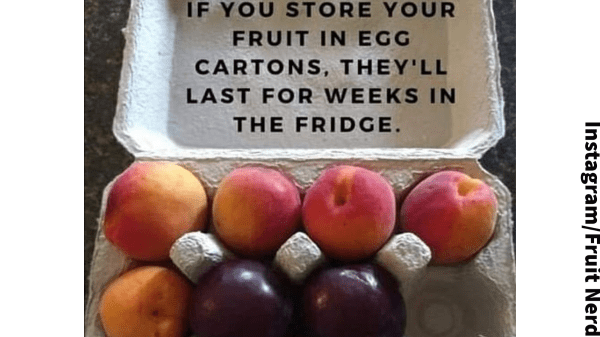
I don’t like using trendy terms. I’m afraid that it will make me sound more hip than I really am.
Nevertheless, one can make an exception.
In this case, life hack. A funny little trick you can use to make your life simpler, easier, or cheaper.
Fruiterer Thanh Truong has one such hack, as reported in the Australia Daily Mail. Once ripe, store stone fruit in the refrigerator in egg cartons—the soft-paper pulp type, not the plastic type.
The idea is that the paper will absorb moisture as well as fungus.

“It won’t work for all fruits,” Thanh contends, “but definitely for plums and apricots”—which are, of course, more or less egg-sized.
Thanh “has never tried the method,” the article notes, “but said the science is the same as professionals use to ship fruit overseas.” At home, if he doesn’t plan to eat fruit for a day or so, he stores it in a plastic container or paper towel.
Thanh’s trick is, then, transferring a technique used for large-scale shipping to the home refrigerator.
Thanh himself hasn’t tried the method, probably because as a fruiterer, he doesn’t need to. He recommends buying fruit twice a week instead.
The idea is ingenious, but maybe we could take it one step further. Is there a possibility of using soft-paper cartons in retail?
You could, say, have a package of three apples in a carton, along with directions for refrigerator storage.
The idea is particularly appealing in that plastic containers of all kinds are (like it or not) rapidly becoming Public Enemy Number One in the eyes of many consumers.
Another option: an egg carton base with a clear, resealable top to enable consumers to see the fruit before buying. In a June interview, Shannon Boase of the packaging company CKF Inc., told me about some of her company’s products that sounded similar.
Thanh’s list of fruits that should be stored in the home refrigerator are apples, stone fruit, grapes, berries, pears, cut fruit, and fresh figs.
Those that can be left out, according to him, are bananas, citrus, mangos, watermelon, pineapple, and papaya—presumably until they’ve been cut.
I don’t like using trendy terms. I’m afraid that it will make me sound more hip than I really am.
Nevertheless, one can make an exception.
In this case, life hack. A funny little trick you can use to make your life simpler, easier, or cheaper.
Fruiterer Thanh Truong has one such hack, as reported in the Australia Daily Mail. Once ripe, store stone fruit in the refrigerator in egg cartons—the soft-paper pulp type, not the plastic type.
The idea is that the paper will absorb moisture as well as fungus.

“It won’t work for all fruits,” Thanh contends, “but definitely for plums and apricots”—which are, of course, more or less egg-sized.
Thanh “has never tried the method,” the article notes, “but said the science is the same as professionals use to ship fruit overseas.” At home, if he doesn’t plan to eat fruit for a day or so, he stores it in a plastic container or paper towel.
Thanh’s trick is, then, transferring a technique used for large-scale shipping to the home refrigerator.
Thanh himself hasn’t tried the method, probably because as a fruiterer, he doesn’t need to. He recommends buying fruit twice a week instead.
The idea is ingenious, but maybe we could take it one step further. Is there a possibility of using soft-paper cartons in retail?
You could, say, have a package of three apples in a carton, along with directions for refrigerator storage.
The idea is particularly appealing in that plastic containers of all kinds are (like it or not) rapidly becoming Public Enemy Number One in the eyes of many consumers.
Another option: an egg carton base with a clear, resealable top to enable consumers to see the fruit before buying. In a June interview, Shannon Boase of the packaging company CKF Inc., told me about some of her company’s products that sounded similar.
Thanh’s list of fruits that should be stored in the home refrigerator are apples, stone fruit, grapes, berries, pears, cut fruit, and fresh figs.
Those that can be left out, according to him, are bananas, citrus, mangos, watermelon, pineapple, and papaya—presumably until they’ve been cut.
Richard Smoley, contributing editor for Blue Book Services, Inc., has more than 40 years of experience in magazine writing and editing, and is the former managing editor of California Farmer magazine. A graduate of Harvard and Oxford universities, he has published 12 books.




